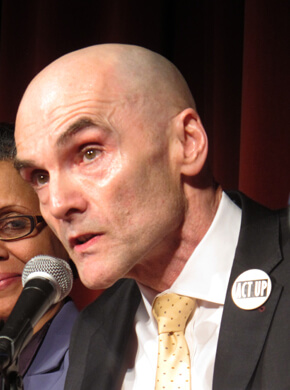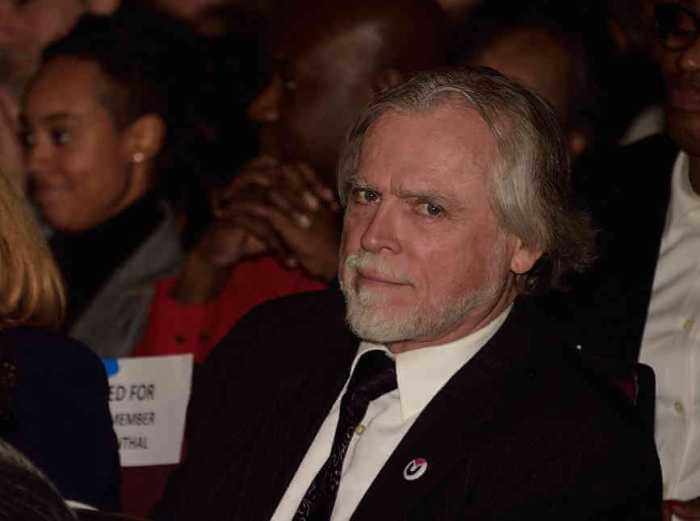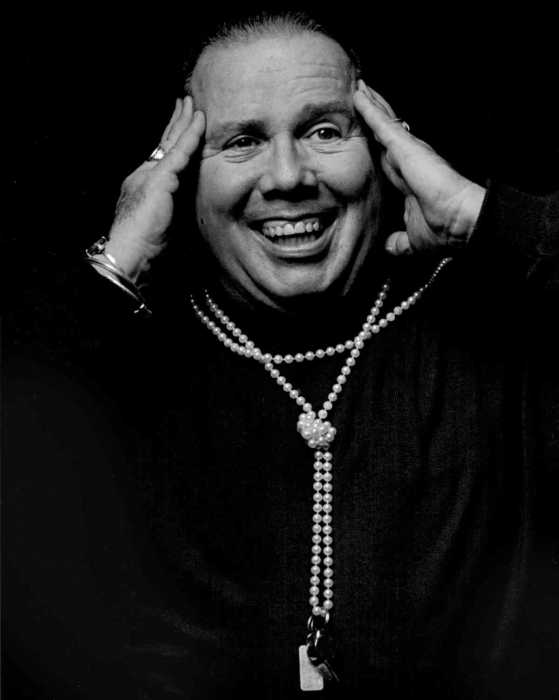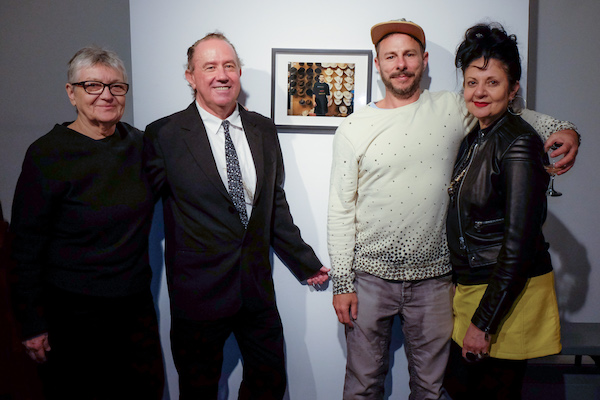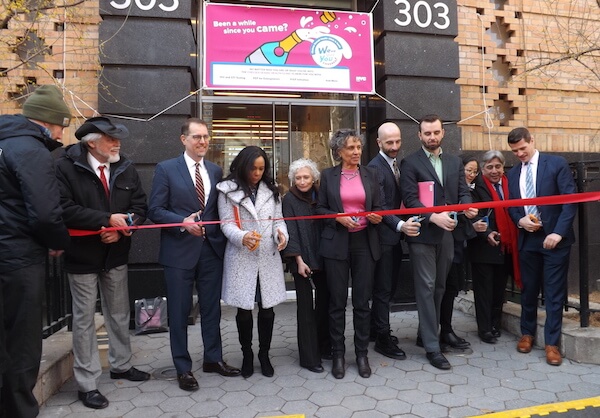Peter Staley at the May 9 town hall. | DONNA ACETO
Hundreds turned out for a town hall meeting on AIDS and aging that was convened in response to the death of a leading member of ACT UP, the AIDS Coalition to Unleash Power.
“A kind of bubble had burst,” said Peter Staley, a longtime gay rights and AIDS activist, referring to the death late last year of Spencer Cox. “What did this say about us?”
Cox, 44, a founder of the Treatment Action Group (TAG) in 1992 and the Medius Institute for Gay Men’s Health in 2005, was among those who fought hardest for anti-HIV drugs in the late 80s and early 90s.
Friends and ACT UP members questioned why Cox, who well understood the need to comply with the sometimes difficult drug regimens, had died. Some wondered if he had succumbed to the depression or risk-taking behavior that the institute had earlier studied among gay men. Online and in person, there were discussions among those who lived through the early years of the AIDS epidemic asking if Cox’s death indicated a broader trend of unresolved problems related to that earlier time.
The May 9 town hall was meant to start a conversation on that topic.
Spencer Cox's 2012 death “burst” a “bubble” among the AIDS generation
Whether the AIDS generation is confronting post-traumatic stress disorder or contending with some other ill is unknown. TAG is working with a researcher at Columbia University to assess the health and well-being of some 200 AIDS activists. Certainly, ACT UP, whose typically young members were on the front lines of AIDS, never came to terms with the deaths many saw around them.
“We had no activist way to deal with all that loss,” Jim Eigo, a longtime AIDS activist, told the crowd of roughly 600 that gathered at Mason Hall at Baruch College in Manhattan.
It could also be that the AIDS generation is showing a normal human response to the death and struggles that were a large part of the early epidemic. Or it could be that this generation is just getting older.
Activist Jim Eigo. | DONNA ACETO
“At around the age of 45, the body begins to reveal its wear and tear,” said Dr. L. Jeannine Bookhardt-Murray, the chief medical officer at Harlem United, an AIDS service group, at the town hall. “It seems that the longer we live, the more we need to grapple with.”
In a community with many single members, the push for marriage rights notwithstanding, it could be that those individuals are entering middle age with their families of choice decimated by AIDS.
“I have friends who tell me if they don’t go out to bars, they don’t see anyone,” said Joe Jervis, who blogs at joemygod.blogspot.com.
It is true that people with HIV confront challenges in addition to the virus as they age. A long-term study on aging and HIV in a 1,000-person cohort found that more than half reported they experienced depression, with two thirds of that group reporting moderate to severe depression, according to Mark Brennan-Ing, the director for research and evaluation at the AIDS Community Research Initiative of America (ACRIA), the group that completed the study.
The study also found high levels of loneliness and stigma, but also significant resilience in this population, in particular among those study participants who were religious, Brennan-Ing said at the meeting.
In his opening remarks, Staley noted that the federal Centers for Disease Control and Prevention (CDC) recently released a study showing significant increases in suicide among older men in the US. While there have been recent suicides of some noted gay men, there is no data that show increases in suicides among gay men of any age.
“It’s too early in this process to say these are our community,” Staley said of the CDC data.
One theme that was consistent throughout the three-hour meeting was that gay groups had largely abandoned the HIV and AIDS cause.
“Gay, Inc.,” as Staley called the leading lesbian, gay, bisexual, and transgender groups, has “turned its back on us,” he said.
Several panelists also expressed concern about the rising rates of new HIV infections among young gay men, with the increases being particularly pronounced among young African-American men. The audience was overwhelmingly older and white. During the question and answer session, one young man said of those HIV infection rates, “This is a gay rights issue. This is the most important issue and yet no one is talking about it.”
Jesus Aguais, the founder and executive director of Aid for AIDS International was also a panelist. The moderator was Perry N. Halkitis, a psychology professor and the director of the Center for Health, Identity, Behavior & Prevention Studies at New York University.

